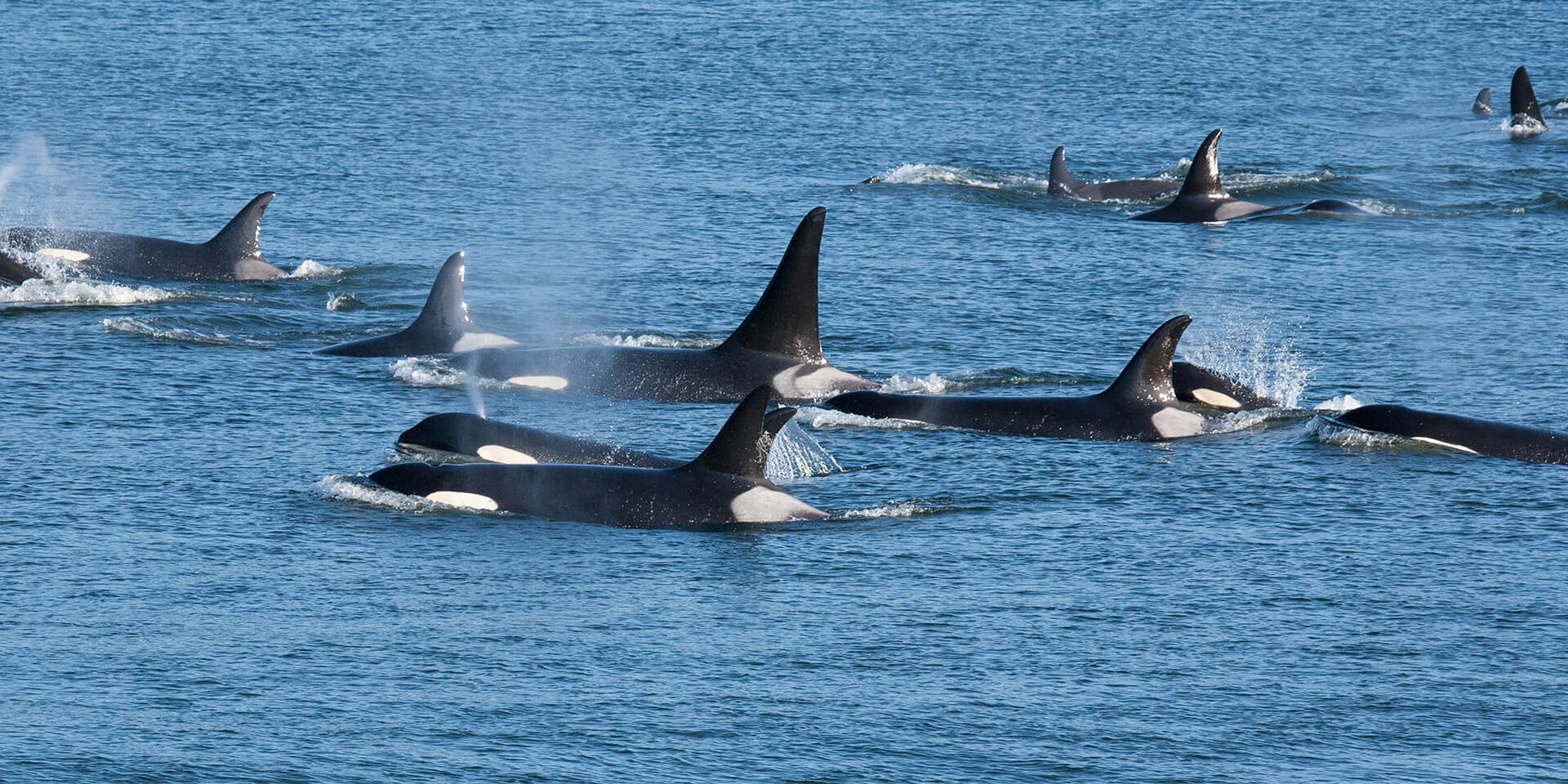Other Events, Meetings, and Workshops
The Marine Mammal Commission hosts and participates in other events, meetings, and workshops that bring together marine mammal policy, science, and management experts and stakeholders to discuss issues related to conservation of marine mammals and their ecosystems.
Browse the links below to learn more about some of the recent meetings and workshops we are involved in.
Working Meeting of the Commission
July 25, 2024
The Commission held a working meeting to discuss and, as appropriate, formulate recommendations and make decisions regarding three subject areas. All portions of the meeting will be open to the public by Zoom Webinar. Visit the event page for the recording and other details.
Whales on the Brink Symposium
November 16, 2023
The Commission co-hosted a scientific symposium with NOAA Fisheries and the Smithsonian National Museum of Natural History focused on Whales on the Brink: Stories from the Rice’s Whale Discovery and Right Whale Tales and to celebrate the 50th anniversary of the Endangered Species Act. For more details about the symposium, visit the event webpage. Video recordings of the symposium presentations are available on the Smithsonian Natural History YouTube Channel.
North Atlantic Right Whale Tagging Workshop
September 12-14, 2023
The Commission co-hosted a tagging workshop with NOAA Fisheries, the Office of Naval Research, and Fisheries and Oceans Canada in September 2023. The goals of the workshop were to review key knowledge gaps and data needs regarding the movements, life history, and ecology of North Atlantic right whales (NARWs); review the history of satellite telemetry and evaluate progress in tag attachment technologies and follow-up studies; and generate knowledge to inform planning and permitting decisions regarding potential tagging of NARWs. Visit the event page for details. The workshop report is available here.
Marine Mammal Commission Workshop on Health Surveillance
April 19-21, 2023
The Commission hosted a marine mammal health monitoring workshop in April 2023. Veterinarians and epidemiologists from the National Marine Fisheries Service, Fish and Wildlife Service, and the National Wildlife Health Center, along with subject matter experts from the U.S. and abroad, discussed approaches and priorities for monitoring pathogens, toxins, and health parameters that are likely to be influenced by a changing climate. The Commission synthesized information from the workshop into a report and sampling plan, which is now posted on the Commission’s website. The plan identifies priorities for sample collection and testing that will contribute to systematic health monitoring and surveillance of marine mammals nationwide. The plan will serve as a resource for researchers and organizations to guide health monitoring and surveillance of marine mammals to detect impacts of climate change.
Marine Mammal Stranding Response, Health Surveillance, and Conservation Webinar
February 8, 2023
The Commission is hosting an informational webinar to provide an overview of the National Marine Mammal Health and Stranding Response Program and review how data from stranding networks enable effective marine mammal health surveillance and inform management and conservation efforts. Visit the event page for details.
Federal Agency Approaches to Reducing Vessel Strike of Cetaceans
April 12, 2022
The Commission and Committee of Scientific Advisors met to consider actions for reducing vessel strike of large cetaceans. Meeting participants reviewed Federal vessel-routing and speed-reduction programs, including their elements and effectiveness, identified locations where additional measures are or may be needed, and considered recommendations for next steps. Visit the event page for details.
Effects of Low-Salinity Exposure on Bottlenose Dolphins
March 23, 2021
The Commission convened a webinar to review the findings of the northern Gulf of Mexico bottlenose dolphin unusual mortality event (UME), provide information on the potential impacts of low-salinity exposure on dolphins and their prey, identify data needs, and discuss options for mitigating and monitoring impacts to dolphins and their prey from future low-salinity exposure. Visit the event page for details.
Subsequent to the webinar, the Commission requested additional analyses on the potential effects of the proposed Mid-Barataria Sediment Diversion project in Barataria Bay, Louisiana, on recovery of the Barataria Bay stock of common bottlenose dolphins, and how the project might delay the stock’s recovery from the effects of the 2010 Deepwater Horizon oil spill. A copy of that request and results of that analysis are available here, and the final report is available here.
Mississippi Bottlenose Dolphin Workshop
January 11-13, 2021
Marine Mammal Commission staff facilitated a virtual workshop focused on enhancing conservation of bottlenose dolphins in Mississippi state waters. Bottlenose dolphins in Mississippi and throughout the Northern Gulf were significantly impacted by the 2010 Deepwater Horizon oil spill, and tracking recovery requires long-term monitoring and an ability to identify and minimize ongoing threats. Workshop participants from the National Marine Fisheries Service, Mississippi-based marine mammal research and stranding network facilities, and Mississippi state agencies discussed current capabilities and research activities within the state and current knowledge regarding the status, stock structure, and major threats to bottlenose dolphins in Mississippi state waters. Discussions focused on critical uncertainties and opportunities for enhancing collaborations and expanding partnerships within the state and beyond to advance conservation efforts. A summary of the meeting is available here.
West Coast ‘Ropeless’ Fishing Gear Meeting
July 19, 2018
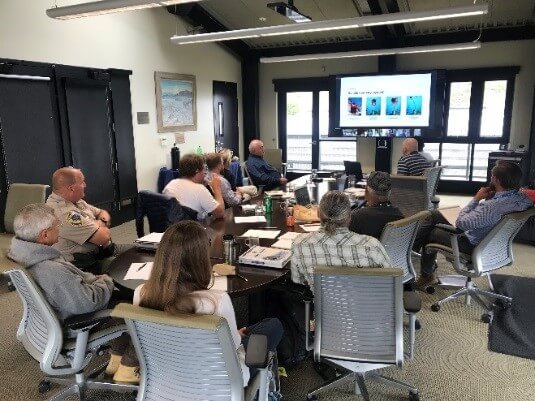
West Coast Ropeless Meeting (Credit: Geoff Shester)
The Commission and Oceana co-organized a meeting, hosted at The Marine Mammal Center in Sausalito, CA, to share information on three currently available ‘ropeless’ (or on call trap retrieval) systems, discuss fishermen perspectives, and develop a plan to have several fishermen test a few of the systems in the coming 2018-2019 season of the West Coast Dungeness crab fishery. The meeting convened 19 stakeholders including Commission staff, members of the California Dungeness Crab Fishing Gear Working Group, gear manufacturers, resource managers, scientists, and more. The meeting summary is available here.
Passive Acoustic Surveying Workshop
April 16-17, 2015
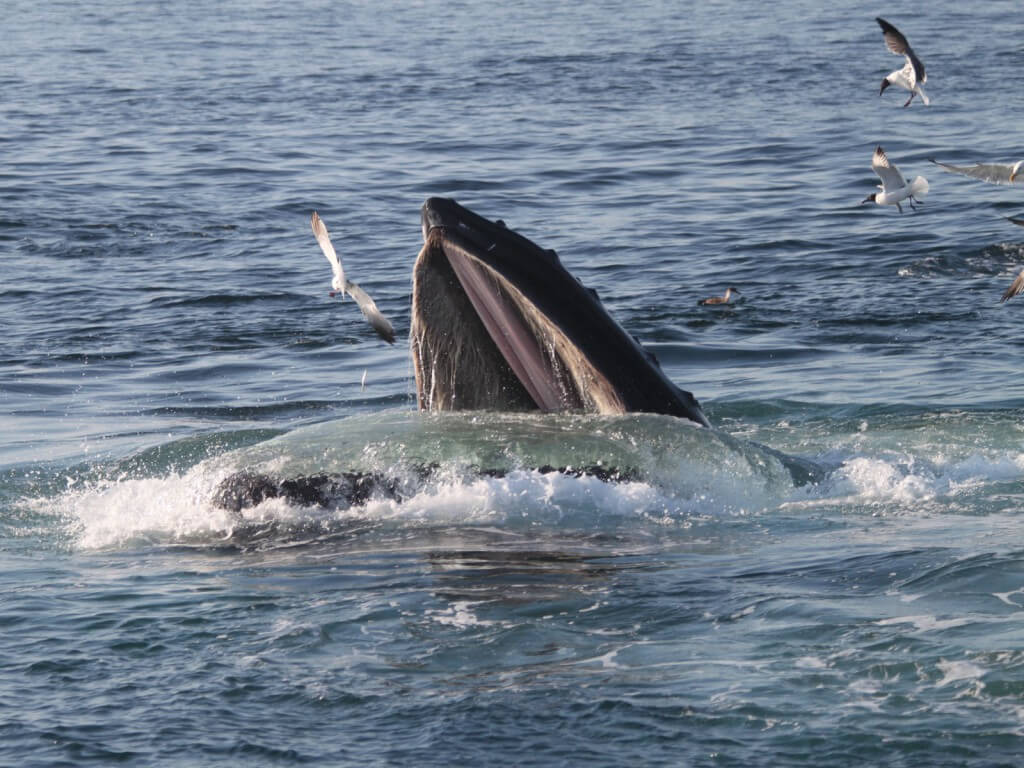
A humpback whale feeds in Stellwagen Bank National Marine Sanctuary. (NOAA)
The Commission and NMFS sponsored a workshop in La Jolla, CA on the use and development of passive acoustics to collect data for marine mammal stock assessments. The workshop convened 23 acoustics experts from NMFS and other institutions to assess the state of the science and technology, identify the challenges faced by NMFS in using passive acoustics to survey marine mammals, and to highlight the areas in which NMFS needs to concentrate its efforts going forward. The workshop report is available here.
Gulf of Mexico Marine Mammal Meeting
April 7-8, 2015
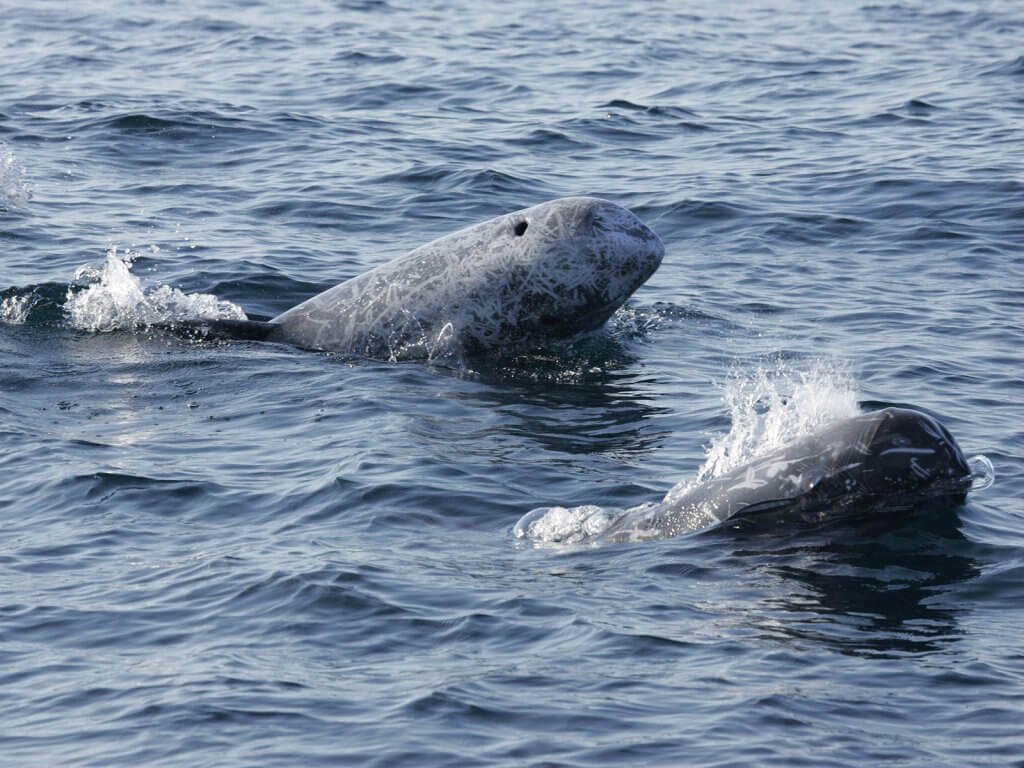
Risso’s dolphin. Photo taken under a NOAA-SEFSC MMPA Permit No 779-1633. (K Mullin, NMFS SEFSC)
The Commission and several partners from other federal agencies, the academic community, and non-governmental organizations convened the Gulf of Mexico Marine Mammal Research and Monitoring Meeting in New Orleans, Louisiana. The meeting brought together scientists, resource managers, and industry representatives working in the Gulf of Mexico to discuss current research and monitoring programs and identify priority information needs for the next 5-15 years. The meeting also sought to promote collaboration and data sharing, and explore potential funding sources. Learn more.
Unmanned Aerial Systems Workshop
October 28-29, 2014
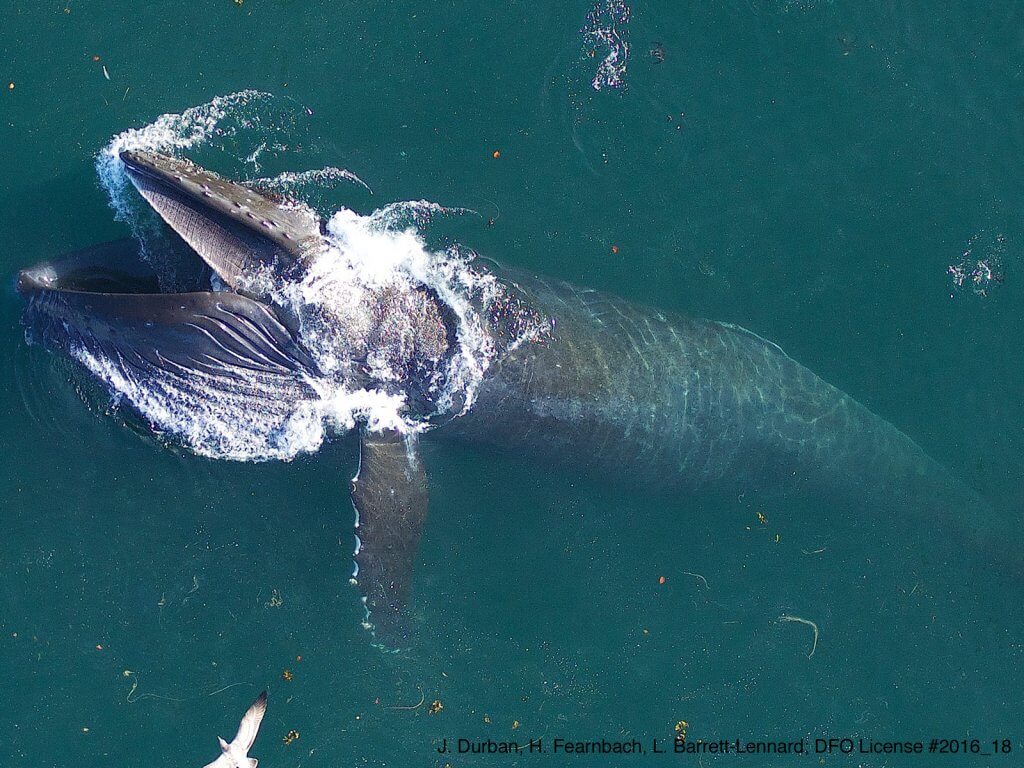
Humpback whale lunge-feeding on schooling fish off Vancouver Island, taken from an APH-22 hexacopter at >100ft altitude (J. Durban, H. Fearnbach, SWFSC; in collaboration with L. Barrett-Lennard, Vancouver Aquarium; DFO License #2016_18).
The Commission and the National Marine Fisheries Service (NMFS) sponsored a workshop in Pittsburgh, PA on the use and development of unmanned aerial systems (UASs) to collect data for marine mammal stock assessments. The workshop convened 33 UAS experts from NMFS and other institutions to assess the state of the science and technology, identify the challenges faced by NMFS in using UASs to gather data to support marine mammal assessments, identify new uses for this and related technologies, and to highlight the areas NMFS needs to concentrate its efforts to advance this technology. The workshop report is available here.
Alaska Native Consultation and Co-Management Meeting
December 10-12, 2012
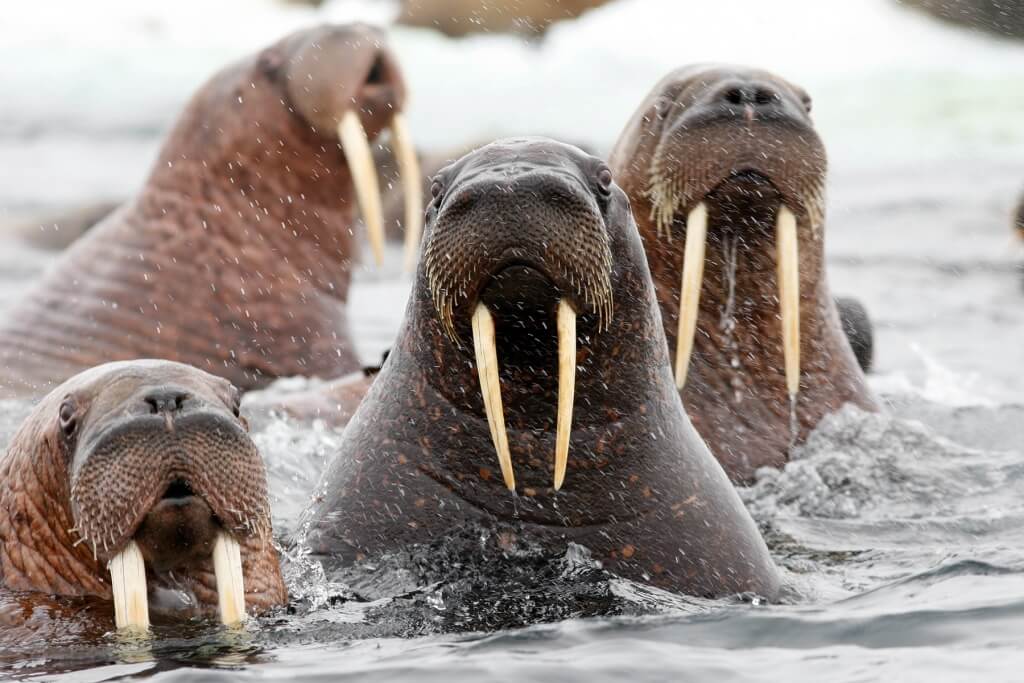
Walruses group and ‘head bob’ to investigate unknown disturbances such as predators or humans. (shutterstock)
The Commission, in collaboration with the Indigenous People’s Council for Marine Mammals (IPCoMM) and the Environmental Law Institute (ELI), convened a meeting to review and seek ways to improve the tribal consultation process. Participants included representatives of various federal agencies, Alaska Native organizations, other Alaska Native tribal members, and public and private stakeholders. Learn more.
Marine Mammal Acoustic Disturbance Symposium
October 21, 2011
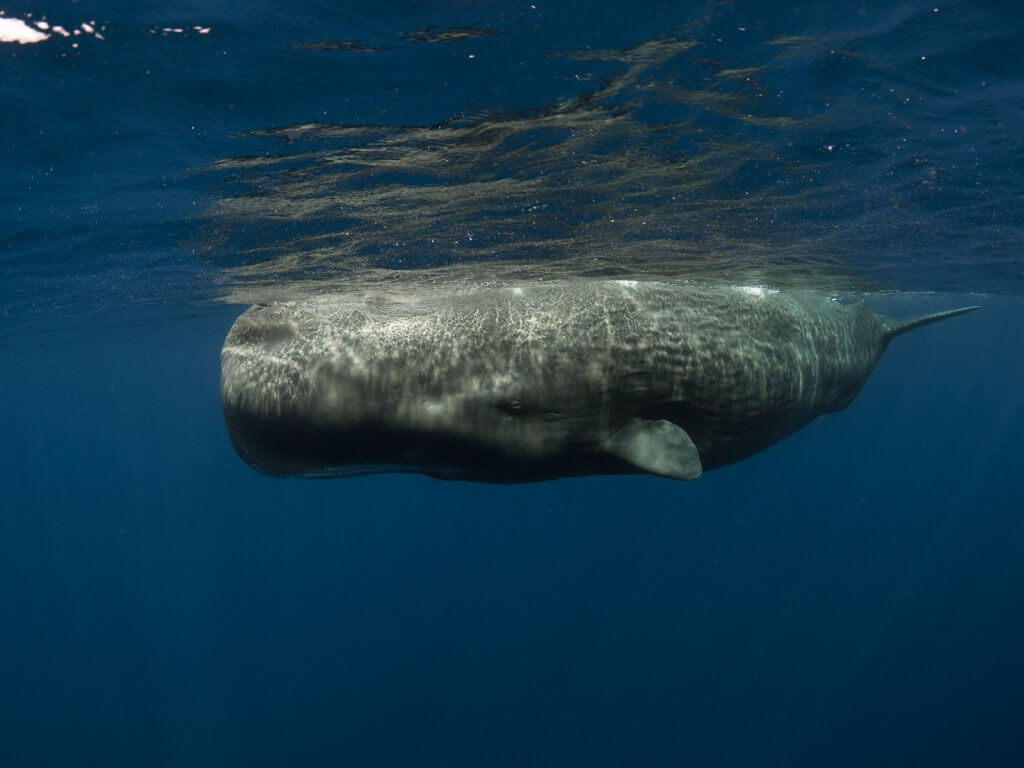
Sperm whale. (Shutterstock)
The Marine mammal Program of the Office of Naval Research and the Marine Mammal Commission co-sponsored a symposium in Washington, D.C. on the population-level consequences of acoustic disturbance. The symposium reflected an interactive, synthetic process over the past three years that has engaged 30 experts from 20 institutions worldwide. Learn more.
